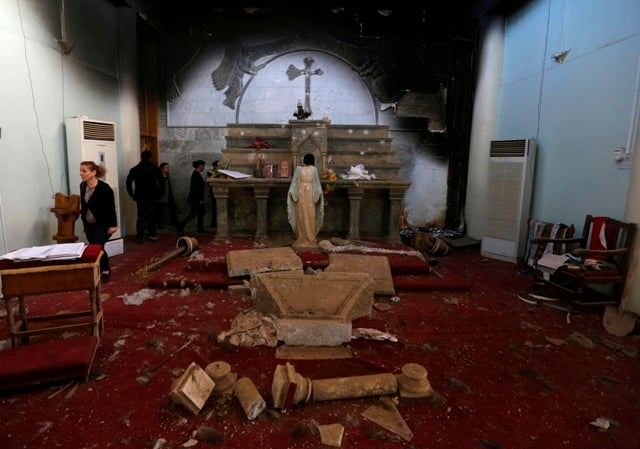Keramlis, a Christian town on the Nineveh Plains in northern Iraq, fell to ISIS in August 2014, sending its inhabitants fleeing. The town was retaken by Iraq forces three weeks ago as part of the push for Mosul, but most of its homes were destroyed in the process.
There were gasps, followed by tears at a small church in northern Iraq as a group of Christians returned to their parish Sunday to find that everything had been destroyed, including the statue of the Virgin Mary, which Islamic State (ISIS) terrorists had decapitated before they left.
A confessional had been turned into a closet, a tomb had been desecrated, red prayer benches were burned. As the Rev. Thabet Habib recited prayers at the St. Addai church, the sound of broken glass crunched beneath worshippers’ feet.
Keramlis, a Christian town on the Nineveh Plains in northern Iraq, fell to ISIS in August 2014, two months after the terror group took Iraq’s second-largest city of Mosul and surrounding areas, sending most of its inhabitants fleeing. The town was retaken by Iraq forces three weeks ago as part of the push for Mosul, but most of its homes were destroyed in the process.
Many residents of the ancient Assyrian town some 18 miles (30 kilometers) southeast of Mosul now live in camps in Iraq’s Kurdish region. Hundreds of others fled to neighboring countries, Europe, the United States and elsewhere.
Some who returned Sunday came to attend a prayer service in their hometown, and check on their homes.
‘I Feel Great Sadness’
Emotions ran high when the church bell tolled for the first time in more than two years, but standing amid the ruins of their church, few could summon hope for the future.
“It was amazing, I got goose bumps. The bell for us means a great deal,” said Sahir Shamoun, an athletics teacher who drove four hours with his wife from Zakho, near the Turkish border, to check on their home Sunday.
Shamoun and his wife found their home largely standing, amid a vista of almost completely destroyed houses; but all their electronics and furniture had been stolen.
“I feel great sadness,” he said. “I’m not sure when or if I’ll be back. I think of my children, will they have a future here?”
Christians once constituted a sizeable minority in Iraq, but their numbers have dwindled sand many have emigrated to the West to escape Muslim violence and persecution.
Shamoun himself said he has been displaced five times, and that he now believes there is no future for Christians or minorities in the Middle East.
“You put the cornerstone for your home, but still you know it’s not yours,” he said. “But we are stubborn people, we will keep building.”
Inside the church, Habib, the priest, and several other men banged bibles and other holy books against each other, creating puffs of dust. A 54-year-old woman, Almaz Sleiman, sobbed quietly, holding a tissue against her face as she looked around. Prayers were held under the watchful eyes of armed Assyrian Christian militiamen, known as the Nineveh Plain Protection Units.
“First when you see it of course it’s unsettling, and then you cry because of the situation here and the conditions we are living in now. Honestly I cannot describe the way I feel,” Sleiman said.
While the Christian population is shrinking in the Middle East, it is steadily growing in Israel, the only country in the Middle East that safeguards the Christians and enables them to practice their faith freely and safely.
By: AP and United with Israel Staff
[donate_isis boxed]
Do You Love Israel? Make a Donation - Show Your Support!
Donate to vital charities that help protect Israeli citizens and inspire millions around the world to support Israel too!
Now more than ever, Israel needs your help to fight and win the war -- including on the battlefield of public opinion.
Antisemitism, anti-Israel bias and boycotts are out of control. Israel's enemies are inciting terror and violence against innocent Israelis and Jews around the world. Help us fight back!
